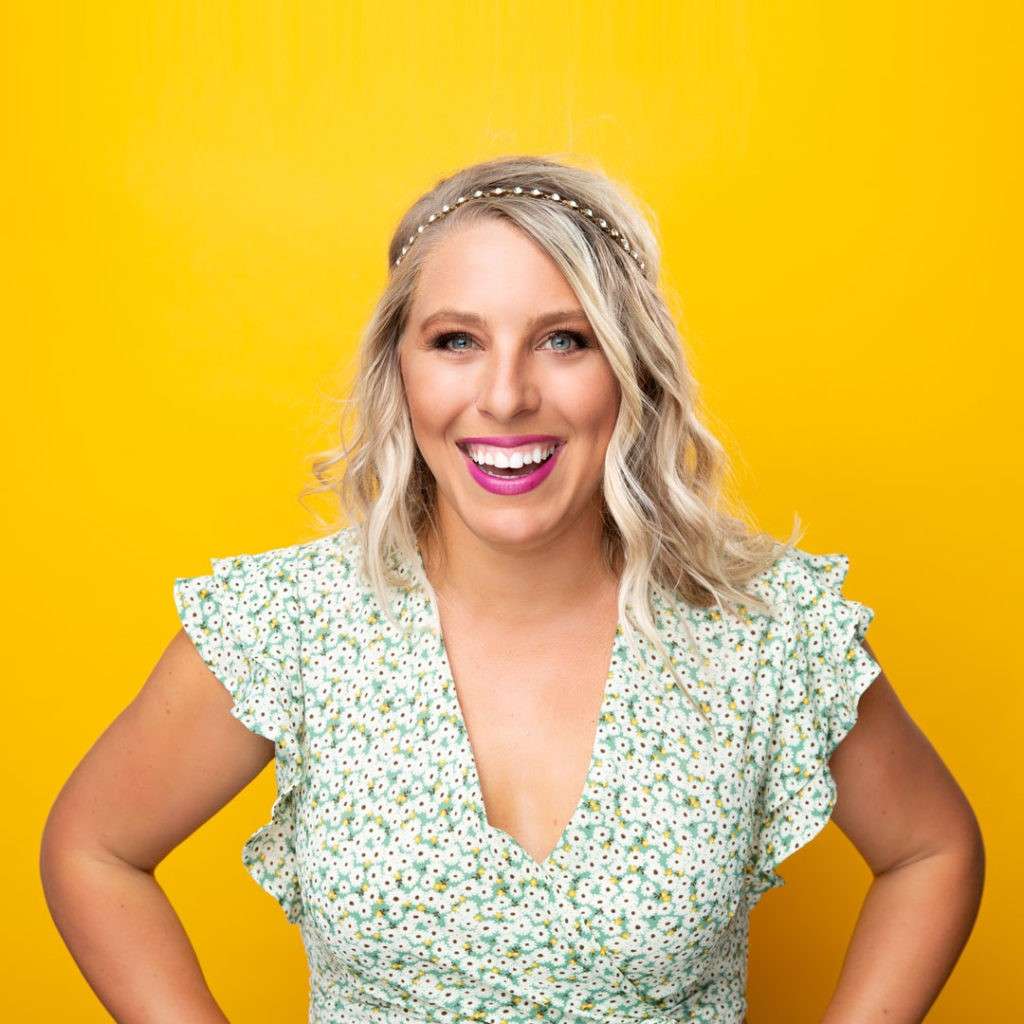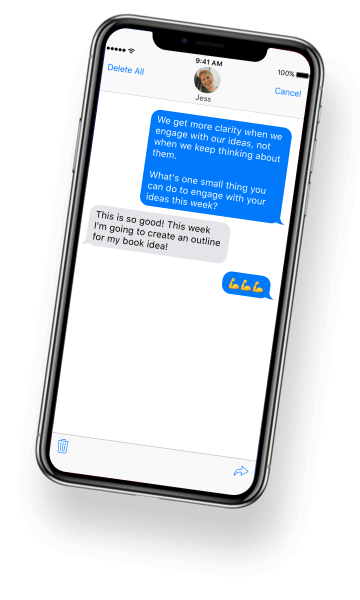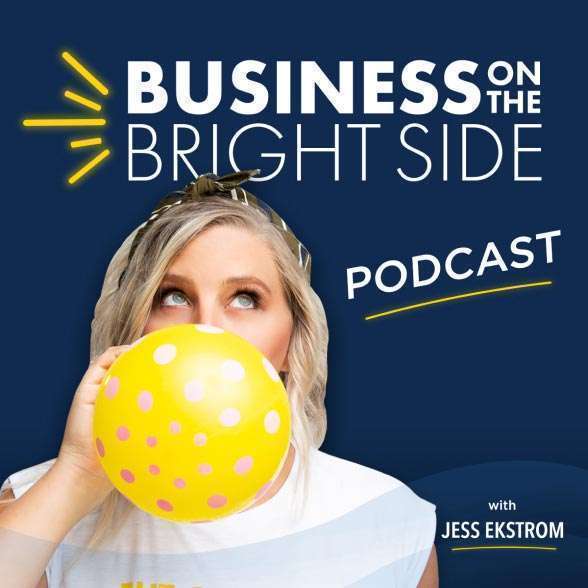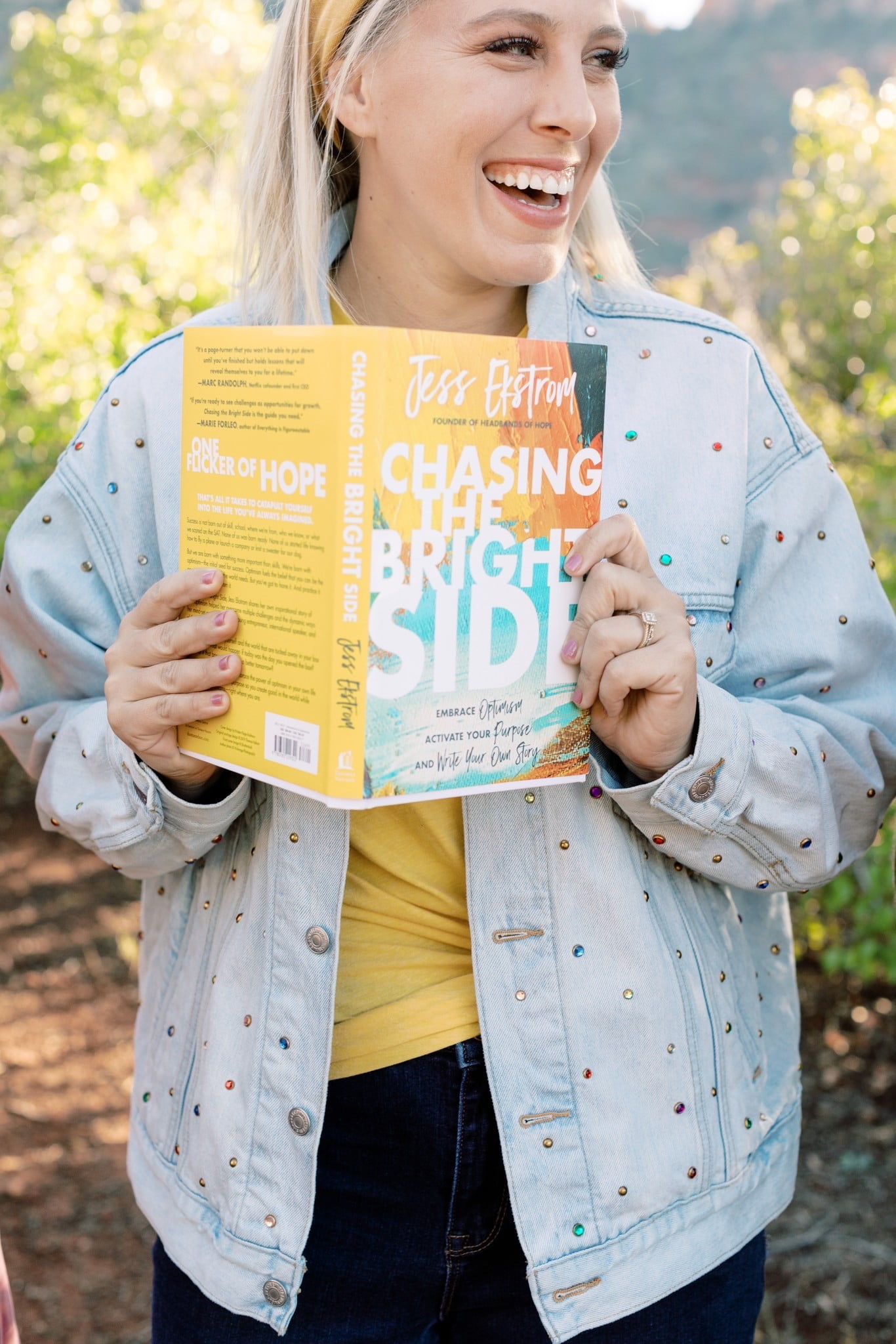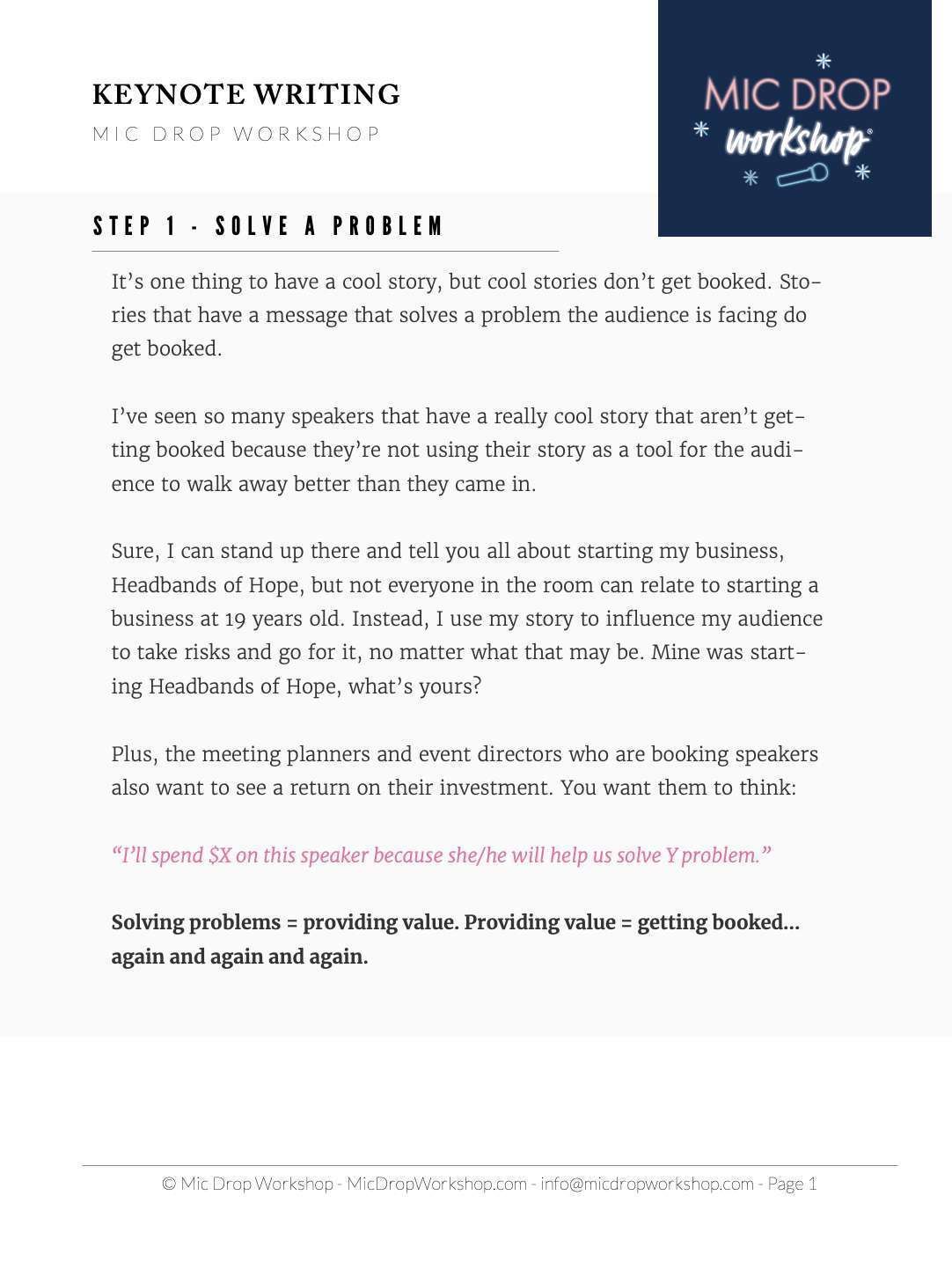SHOW NOTES:
There is so much power in connecting with and building up other women. That’s why I was honored to bring Natalie Franke, co-founder of The Rising Tide Society and community leader of Honeybook, on the podcast to discuss how you can genuinely root for other women.
Listen in as we discuss why she decided to open up about her journey to motherhood and connect with others who are living through the same experience.
This episode of Business on the Bright Side was recorded as part of the January 2020 You 2.0 Challenge hosted by Prompted, a guided online journal for people who do. Try Prompted today and get 20% off the annual plan with the code POD!
Meet Natalie (2:30)
Cheering for Other while Feeling Comparative (6:10)
Opening Up (11:22)
The T-Shirt Shop (21:45)
Links
nataliefranke.com
shopnataliefranke.com
instagram.com/nataliefranke
Prompted Pathway: Community Over Competition with Natalie Franke
Review the Transcript:
Jess:
Welcome back, everyone. Today, I am so excited to have my friend Natalie Frank on the podcast. Natalie Frank is the co-founder of Rising Tide Society and author of Built to Belong. And super exciting, Natalie’s actually doing a guest prompt pathway on Bright Pages. So if you head to brightpages.com, you can actually select Natalie’s community over competition, prompt pathway, and get seven guided journaling prompts to help you explore how community over competition plays a role in your life. And if you’re not a member of Bright Pages yet, you can use the code pod, P-O-D, for one month free. So today, on the podcast, we’re actually going to use a interview from Natalie when she spoke at the You 2.0 conference. And I’m actually recording this introduction on my porch. So you might hear some birds chirping right now. But what I was saying was that we are using Natalie’s interview from You 2.0, where we spoke about how to genuinely root for other women, which is something that Natalie taught me many years ago. And I am so excited to share with all of you today. So please welcome Natalie Frank.
Jess:
What’s up, everybody? It is Jess Ekstrom and Welcome to Business on the Bright Side, the podcast where you can learn how to make a living and make a difference at the same time. Life is short, and so is my attention span. So let’s get started. All right. Put your hands together virtually. Let’s welcome our guest speaker today, my girl, Natalie Frank. Hello.
Natalie:
Hey. Okay. I was nodding the whole time. As you’re talking, I’m sitting there. I’m nodding. I’m fully engaged, and I think I need Bright Pages in my life. I’m like, “I need this.”
Jess:
Girl.
Natalie:
Is the art of writing something down the power that comes from that?
Jess:
It really does. It’s really just helpful to do this mind dump. But I want to work on a pathway with you for your upcoming book. Can you tell us about the upcoming book? Are you allowed?
Natalie:
I am. I’m allowed to give little bits and pieces. [crosstalk 00:02:27]. Jess-
Jess:
Tell us who you are, too, for anyone who doesn’t know.
Natalie:
Sure. Okay. So we’ll start there. So I’m Natalie Frank. I am basically an entrepreneur and a community builder. I started as a full-time photographer. Built my business doing that and found myself hitting all my goals and checking all of the boxes and yet still feeling incredibly alone in the pursuit of building a business. And so five years ago, I decided that I needed to change that. And I had to find a community of people that could understand what it was like to build a business. To take an idea and create something new from it. And so that desire led to the founding of the Rising Tide Society, which is a community of over 70,000 creative entrepreneurs and small business centers around the world that all unite under this mantra of community over competition.
Natalie:
And that led me to many other things, including working with HoneyBook, which is an awesome CRM platform that helps business owners to run the backend of their business, all the operations, contracts, things like that. And I’m also writing a book or have written a book. I guess, technically, we’re now moving into the “It is done.” Jess and I were chatting before this about how we’re finalizing our cover. And we’re starting to do type-setting to see what the actual book, the interior design of the book will look like.
Natalie:
But the heart and soul of this book is essentially the premise that we are built to belong, and yet we are also created to compete. That as human beings, there is this delicate balance between wanting to be loved and liked and have community. And yet still internally within all of us, this hope to be our best and to do well and to strive and to achieve and any other Enneagram 3s out there know exactly what I’m talking about at a elevated and intense degree. But all of us have this within us. So the book gets to the heart of how do we cultivate these extraordinarily rich relationships and community with others that helps all of us to succeed? That surrounds us with people that want to see us win? That want to see us thrive? That are cheering us on and that we can do that for others?
Natalie:
And how do we actually do it? How do we change the trajectory of our lives by creating thriving communities and support systems with other people that are all about that collaborative mindset and are all about seeing everybody succeed and win? And so the book comes out at the end of August, and I’m really excited to birth this baby into the world and have it be out there. It’s been a long journey.
Jess:
I feel like this book and your entire platform was created for my problem that I have. I was the kid in gym class that I would need to get first on the warm-up lap. Nothing counted towards the warmup lap, but if someone was ahead of me as we were running around the gym to warm up, I couldn’t handle it. And that bled into my career and a lot of unhappiness.
Jess:
And I think that when you are trying to create something or do something, you want to do this to have freedom in your own life. But I felt like I was bound to measuring my success based on someone else’s story. My ruler for myself was always in comparison to someone else. And it was honestly, you’re going to think I’m blowing smoke up there, but it was meeting you that opened up my eyes to be like, “No, there’s room for everyone. And someone else’s success is not robbing me of my own.” Was this a way that you always were? Or how did you discover it?
Natalie:
That’s a really good question. So, no, I actually think because I struggled with it, I discovered it. So I think it was something that for years and years and years, that was how I approached things too. I forgot that human beings were not highlight reels. And I got trapped in this idea that other people were right, like the measuring stick for my own success or that somehow, I was always feeling like I was falling short or falling behind. And this was both personally and professionally. So there were different points in my journey where on a professional note, I think I felt that way when I was building my business. I always was looking at what other folks were doing. And feeling like, “Gosh, I’m not as good as this person. I’m not as talented here. I don’t have the right words to say there. I don’t know how to do this perfectly.”
Natalie:
I felt like the only one who was a mess and who was imperfect. And yet in my personal life, as well. I have struggled with infertility for years. I mean, truly years and years and years. And having that feeling of, “Well, everyone else is out there getting pregnant or starting a family.” Or my friends especially were growing their families. And I was still waiting for an invitation to join the party. I felt like the girl, standing outside the door to the next step of my life, just waiting and waiting and waiting and comparing myself to folks that were going on to do those things that I desperately wanted, both professionally and personally.
Natalie:
And so, no, this entire kind of like truly, calling for me that its sort of become, I think, arose from the fact that I struggled with it so deeply. And I arrived at it simply through beginning to uncover over and over again the reality that I had a choice. It was sort of this crossroads. Whenever I was met with somebody else winning, somebody else succeeding, somebody else making it in the personal and professional pursuit that I was also going after, I had a choice where I could compare myself, and I could adopt this competition mindset, this comparison mindset of, “Well, they’re beating you. They’re winning. They’re leaping ahead, and you’re failing. And that’s one path to go, one road to go down. Or I could choose to take the complete opposite path. I could choose to become somebody that is their biggest cheerleader. Somebody that is wanting to see them win, wanting, rooting for them to succeed.
Natalie:
And in the pursuit of that I could completely shift my perspective. I could take the reins of the small bit of this that I truly can control, which is how I react to things that come our way. It’s how we react in the face of uncertainty and challenges and of good things as well. And steer my ship towards that. And then say, “No, I want to see them win. If they win, it’s proof that I can do it too. If they succeed, it’s evidence that there is room for us to do this.”
Natalie:
It’s the same thing. Look at entrepreneurship. We often say, “If you see people doing that thing you want to do, that’s not a reason to stop. That’s actually validation for your concept. That is proof that there is market demand.” And the same applies to so many other facilities. When you see somebody going up against all odds and winning, it makes it a little bit easier for the rest of us in their wake to be moving forward and making that progress. And that applies to everything. But I mean…
Jess:
Having a female vice president be inaugurated this week. Seeing all the little girls, like no matter where their family stood politically, being able to see what’s possible and see examples. How does it feel? I mean, you remember as a little kid learning about the presidents and looking at the wall and saying, “Oh, this is just a man’s job. This is something that I can’t do.” So I love that mindset shift of like, when you see someone succeeding or doing the thing that you so desperately want, it shows that there is a path. It shows that it’s possible. And one of the things that you talked about, like almost proof of concept, and maybe you did this writing your book? There’s a part of a book proposal called comparative title analysis-
Natalie:
Yes.
Jess:
Where you have to pick three to five best-selling books that are in your lane, and you have to show how your book is similar. Where can you draw the similarities? And then where’s your degree of difference? And I think that’s such a cool way to think about anything. Like, oh yeah, this concept works because a publisher doesn’t want you to reinvent the wheel. They need to see that it’s out there.
Jess:
Quick question. Have you ever thought about writing a book? Because in my opinion, books are the new business card. After I published Chasing the Bright Side with Harper Collins, I was able to get more speaking engagements. I was able to get more press placements and really grow my personal brand and impact. And I want to help more women get traditional book deals like I did. So I’m hosting a free workshop where I tell you three secrets to landing a book deal. Head to Business on the Bright Side.com, and sign up for free today.
Jess:
Tell us a little bit why you decided to be so open, which I’m so grateful about your fertility journey and IVF?
Natalie:
Yeah. People often ask like, “Oh, well, how did you decide to be transparent about it?” Or why do you, why you decide to be vulnerable about anything? Cause I’ve shared different parts of health journeys from having a benign brain tumor and going through brain surgery to fertility treatment that brought us our son to now, the road’s been a little bit longer and harder. We had three failed rounds last year. And I shared that. I shared the failure and the pain that came with that each time we failed, and now we’re pushing IVF. And yes, I’ve done more sharing I think this time than I ever have. And look, the reason here is very simple.
Natalie:
I share for the people who don’t yet know they need to hear my story. For the ones who are going to walk this road long after I’ve walked it and need to know that they are not alone. I share to normalize the parts of the human experience that I think are far more common than we realize. And that goes for so many different things. That goes for the personal stuff that I share, but also the professional. It goes for sharing the business journey, the entrepreneurial journey, the mistakes I’ve made, which there are many. The errors and the learnings and the imperfect growth that I think all of us are striving towards every single day because that is human. Perfection is not human. And it’s also not interesting. It’s not the best story. They’re not perfect.
Natalie:
And the protagonist doesn’t always triumphantly run forward with bold optimism and courage. Sometimes a protagonist shakes and is afraid and cries and falls apart and needs other people to carry her. That’s humanity. That’s reality. And so for me, it’s like, I don’t want to keep showing up and telling half the story on the internet.
Jess:
Right.
Natalie:
I want to be me. I want to be me. And this applies to so many different aspects where I’m uncovering and unpeeling the layers and the pressures that so many of us have been taught and had been told when the time we’re very young to like, “Keep a brave face, keep your chin up.” Don’t let them see you cry. Don’t grow up there and be strong. And there’s nothing wrong with crying and being vulnerable and being honest and being open because there’s something really powerful in that pursuit of vulnerability.
Natalie:
And so for me, I think it goes back to that desire of like, “I’m going to have to go through this pain.” In some ways, it’s a privilege to get to go through it, to be able to have this treatment. To be able to have doctors and a medical team to treat my infertility. And yet, there’s going to be pain in the process. And if there’s going to be pain, how can I find purpose? And for me, seeking to find purpose is often very difficult in moments like this. But if I can share. And I can be honest. And I can tell my story. And somebody else on the other side of that… I think it’s Brene Brown who says, “That could be somebody’s survival guide.” If that can be the case, where somebody else is on the receiving end, who maybe can’t share their own journey. Maybe hasn’t shared. Maybe doesn’t even know that they’re going to walk through that season, and I can even make a dent in that, make it even a tiny bit easier. It’s worth it. It’s worth the criticism. It’s worth the-
Jess:
Unsolicited advice.
Natalie:
Me showing off my stretch marks while I’m doing my injections at night. It’s all of that because I do know… And I’m receiving them constantly, the messages from folks that are like, ‘Wow, I didn’t realize. I was even less alone than I thought.” I was reading through your comments. And so many other people are in the season going through this. And this applies to everyone listening to this. You’re all walking through something, you’re all navigating something, or you’ve navigated something. You’ve come through it. You got the battle scars to prove it. And I think this power of charting a course this year like Jess is having you do through actually writing it down and thinking and processing through what you want to be and what you want to become. That process and that pursuit, it’s not even about us. You all, it’s not even about us. It’s not.
Natalie:
At the end of the day, it’s about the person on the other side whose life is going to be changed because you told your story. Whose entire world is going to be rocked because you had the courage to say one sentence that changes everything for them. And that statement, “I am not alone,” sometimes is the difference for us, between believing we can keep moving forward and giving up on the journeys when they get tough.
Jess:
I have chills right now. And Suzanne, in the comments put, wrote this quote that you said that was… I mean, stop me in my tracks. “If there’s going to be pain, how can there be purpose?” I mean, that alone is just… That’s like, as we’re navigating our stories, either through this week’s challenge on Bright Pages or just whatever, a lot of times, it’s hard to connect the dots or see the silver lining right out of the gate.
Jess:
But it doesn’t mean that it’s not going to evolve. It doesn’t mean that it’s not going to be there yet. Tell us a little bit more about this specific theme and how it related to your brain surgery that you had, which was… I mean, I assume a monumental point in your life.
Natalie:
Yeah, no, I mean, it changed everything for me. So to give some context, I guess to that. I forget sometimes when I drop it, people are like, “Wait, what? You said brain?” I’m like, “yeah, yeah.” Again, an experience that I didn’t realize was even more common than I knew going in. But when I was 21, I stopped getting my period earlier in my teens. And had always been told, “Take birth control. You’re going to be fine. It’s this norma, irregular, it’s normal. It’s normal.”
Jess:
Yeah.
Natalie:
Is this women only? I should have asked.
Jess:
Yeah, basically. Yeah.
Natalie:
Okay. So, okay. So I-
Jess:
Except for my husband.
Natalie:
… feel [crosstalk 00:17:23] heading into this. Sometimes when I say period, people get like a little nervous.
Jess:
No, I put period in my book, and I’m like, “whatever.”
Natalie:
And I just tell it like it is, so that’s what happened. I had been told for years and years and years, “This was normal, and don’t worry about it.” And when I was 21, I got engaged and was getting ready to get married and had always dreamed of being a mom. And so I finally advocated for myself with the doctor. And I told him like, “Hey, I don’t get my period regularly. They tried birth control. Nothing’s ever worked.” But I’ve been told, “Look, Danny, here you go. You know where this is going.” I’ve been told it’s normal. And my doctor kind of raised her eyebrows. And she’s like, “Do you feel like it’s normal? And I was like, “No, I don’t.” And she said, “So, let’s investigate it.”
Jess:
Thanks to that doctor. [crosstalk 00:18:06]. Oh, my gosh.
Natalie:
Wait until the end of this story, because that doctor comes back with like… I didn’t write this in the book, but this should be a whole another book in itself. That doctor is amazing. She’s such an incredible advocate for women. And so I basically went through a path of diagnosing. And we did a bunch of tests. And we ultimately found a brain tumor right in my pituitary gland, a macroadenoma pushing right up against my optic nerves.
Jess:
All from not getting your period, that was the signal?
Natalie:
Yep, that was the signal. And I had had other things. In retrospect, you can always look back and say, ‘Oh, so it’s not normal to have migraines and headaches and weight gain and weight loss very rapidly without diet change.” There were things that I blamed on stress-
Jess:
Right, right.
Natalie:
… or other things.
Jess:
One more doctor tells me to calm down, I’m going to flip out.
Natalie:
I know. And so. Look, optic nerves. Yes. And so it was something that led to that diagnosis. And then after that diagnosis, and we talked about that path to being more vulnerable. I didn’t share for five years. I kept it completely private. I kept it just my husband, my family. My team knew. My business team, because I was a wedding photographer, and there was always that risk I would wake up blind. And that tumor had finally pushed on the nerves too much that it had just disrupted the signal from my eyes to the visual cortex. And so I equipped my closest inner circle, but I never shared publicly.
Natalie:
And three years ago, I got a brand new neuro team, a brand new medical team. And they advocated for surgery for the first time. And part of that was born out of the fact that no fertility treatment place would treat me with the size of the tumor. That it wasn’t safe to start those drugs that can sometimes make that pituitary gland get bigger. There were a lot of risks associated. And so my neuro team basically said, “If you want to try for biological children, we need to get this thing out. The best course of action to give you quality of life long-term is to remove it.” And so we went in for surgery, we had it removed.
Natalie:
And it ultimately enabled us to start trying with fertility treatments. So it was all connected, and it’s been quite a journey. But the beautiful little ribbon at the end of this is I did get pregnant after having that tumor removed. And the injectable cycles worked for my son, and the doctor who delivered my son a month early because of preeclampsia was the same doctor who diagnosed my tumor and who had listened to me.
Jess:
Oh, my God, I’m going to cry.
Natalie:
And the only reason I was delivering that baby.
Jess:
I want to cry. But it’s true.
Natalie:
It’s like the only reason I’m delivering a child of my own is because she listened to my voice when I said, “I really don’t think something is right.”
Jess:
Yeah.
Natalie:
She didn’t dismiss me. She wasn’t another doctor to dismiss me. And she was there as he was born.
Jess:
How did I never heard this story? Oh, my God.
Natalie:
And so it was just this… And I didn’t know, it was… you don’t plan for what doctor’s going to walk through the door. You got to practice with a ton of them. And so, my one doctor who I loved when I got induced, she had to leave her shift. And when Dr. Keith came in, I just couldn’t. I lost it. I immediately lost it.
Jess:
Oh my Gosh. Yes. I had no-
Natalie:
[inaudible 00:21:09], first transsphenoidal removal at NYU in 1985. Listen, thank you. Because of you and a lot of folks like you, I know my surgery was easier, and they were able to take care of me and give me a better future and a better life. So being that [crosstalk 00:21:22]. Look at this, Jess.
Jess:
Incredible, Wow. I don’t have the words. I’ve known you for years. And I never knew that story of baby Huey. Well, I just totally lost my train of thought. I had so many things I was going to say. So I’m going to move on to something happy to wrap this up. I mean, that is happy, but something lighter, which is your amazing t-shirts. Which looks like I’m flashing you guys. Oh, let me see that one. This one? Wait, sorry. Let me move the mic because I have… Oh, I love it.
Natalie:
This was our first monthly collab that we did with Justin Shields. And Justin made that. And the shirts-
Jess:
Tell us about how you set this up because I think it’s really cool.
Natalie:
Yeah. So the shirts were born out of this question that we asked on my team, which is like, “How do we manifest this idea of collaboration into our actual business?” We believe it so it’s a value that we aspire to live. This is so often what we find ourselves in, don’t we folks? These are my values that I aspire to live. And then the critical question, but how am I living them? How am I actually living these values?
Natalie:
And so on my team, one of the ways that we decided we wanted to do this was to partner with a different creative or collaborator every single month and create a limited run of one shirt. Just one shirt with one saying that really captured maybe what that creator is fighting for, what they believe in or a value or an idea. And they’ve all been different. And so this was our first monthly one that we did with Justin. The one you’re wearing is part of our standard collection, “But first, kindness,” that we created with Leah of Polished Prints.
Natalie:
And each month is a different collaborator. And so it has been such an incredible project. I’ve gotten to work with some really extraordinary makers and creators. All from different areas, backgrounds, creative endeavors. Like illustrators, to artists, to painters, to all of it. And the lineup just keeps getting… It’s all amazing. There’s not like it keeps getting better. It was hard to beat from the first. So it’s just, it’s amazing all around. And it’s just limited edition, one a month, made by small business, to support a small business. A lot of them, for example, this month’s shirt, which says, “Good things are on the way.”
Jess:
I just found it yesterday. I bought two of them.
Natalie:
Did you?
Jess:
One for me and one for [crosstalk 00:23:46]. It was made for me. Yeah.
Natalie:
Yeah. A hundred percent of my profit from that shirts, all that… By the way, creators are paid. All the collaboratives and creators are paid. That’s really important to me. But my profit from this month’s shirt all goes to an organization called The Cade Foundation, was founded in Maryland. And that money goes to support families who are trying to fund infertility or adoption and are unable. And so it provides financial grants for them. Yes. So, Jill, this shirt was for sale in October. And like I said, it’s only available for that one month, and then they’re gone.
Natalie:
However, I posted because I wore this into my appointment this morning for IVF with Justin. And so there’s a world where maybe we bring some of them back in the future. So stay tuned for that. But the heart is not to just create a giant shop, where we’re just doing sales all the time. It’s more about telling one artist’s story and introducing my community to them and creating one beautiful thing together. And so thanks, Haylee for linking The Cade Foundation, which is a side note for anyone who also shares that passion for making fertility treatment more accessible. It’s a really fantastic organization with a board that is just really wonderful. And the story behind it is great too. And anyway, they do a lot of good in the world.
Jess:
Everything from the design of the shirt to how it feels. I’m kind of picky about my t-shirts. I don’t like to feel like I’m wearing cardboard. And I also sweat a lot, so they have to be breathable. All of it is just so awesome. So you guys definitely, definitely go. I have her website right here and check out her tees. I’m thinking maybe there’s a Bright Pages collection in the future of t-shirts.
Natalie:
I think we need to do it. And I’ll add one more thing. I like to mention, we have sizes small to 4X, so it’s really important to me. Yeah. To make sure that we have as many folks that can wear the shirts as possible, as well.
Jess:
This is great, Natalie. You are wonderful. Where can people find you? I am obsessed with your Instagram doodles and how you just keep it real. So definitely follow Natalie on Instagram. Anything else that people can do to keep in touch with you or stay connected?
Natalie:
Yeah. Look, I do show up a lot on Instagram. I will warn you right now. Since I’m going through IVF, if you don’t like video needles, I’ve been showing my little injections each night. So I’d like to just warn, in case. But I show up there primarily as myself, just me. So it’s messy. It’s real. It’s honest. It’s imperfect. But also, I would just say if you are a business owner and you want to get plugged in, Rising Tide’s a great place to connect with some really amazing folks. We’re all online right now due to the pandemic. But our content is accessible and a lot in all meanings of that term. And so I want to make sure that folks can also check that out. And that’s honeybook.com/specialrisingtide. But Instagram really is sort of like my key spot where I spend probably too much time.
Jess:
Yeah. And I know, me too, and now Instagram and clubhouse for me, I’m like, “I need to do to get a grip.” My screen time report is offensive. But next week, we’ll actually be talking about HoneyBook more as we get into what kind of businesses we’re going to start or grow or some more action steps around it. So stay tuned for that. But Natalie, you are the best. Thank you for keeping it real. Thank you for your friendship over the years, I feel like we were meant to cross paths for sure, without a doubt.
Natalie:
Without a doubt. Now I’m so grateful for you, Jess. Thank you so much for having me.
Jess:
Bye.
Jess:
Thanks for listening to Business on the Bright Side with Jess Ekstrom. I love to send out the episodes every Monday with a quick text and a quote from me. So text me the word podcast to (704) 228-9495. That’s (704) 228-9495. And if you want to see what the show notes are from this episode, head to Business on the Bright Side.com. Hit subscribe here, write a review, and I’ll see you on Monday.

